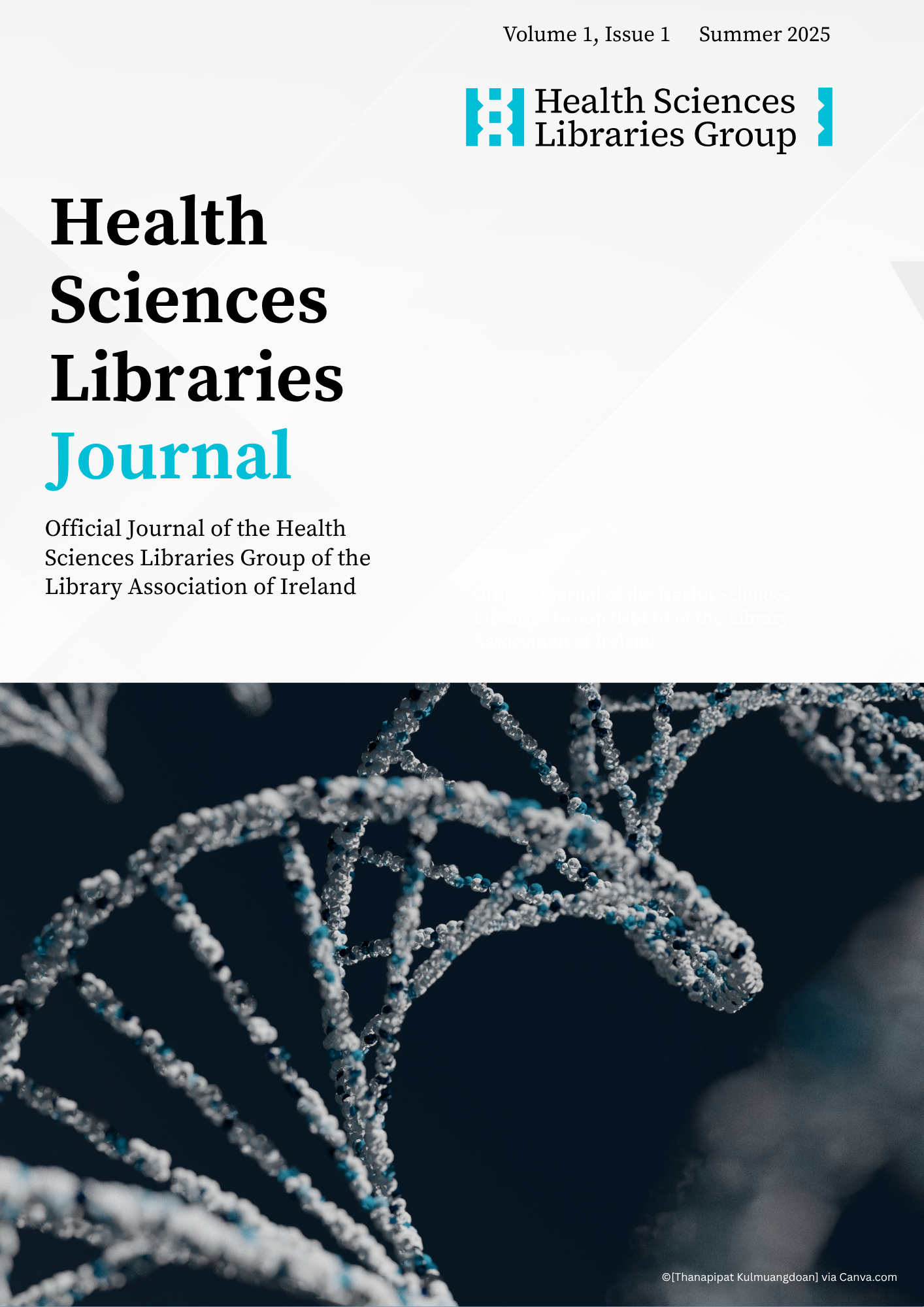Cultivating the Power of Curiosity in Professional Practice
DOI:
https://doi.org/10.33178/hslj.1.1.2Keywords:
curiosity, connections, networks, skills, professionalAbstract
Curiosity is the drive to seek information and explore ideas and perspectives in order to learn something new. It is fundamentally tied to how people make sense and draw meaning from the world and may be viewed as a knowledge network-building process. There is increasing acknowledgement that being curious can bring significant advantages, particularly in jobs characterised by high demands for learning. Cultivating curiosity helps foster open environments that inspire new ideas, innovations, efficiencies and adaptive behaviours. We can enable this by providing sufficient novelty and complexity in our systems and teaching, and by building deeper connections with stakeholders. This article briefly examines how and why we should cultivate this trait in our work and workplaces.
References
Arp, L., Woodard, B. S., & Hensley, R. B. (2004). Curiosity and creativity as attributes of information literacy. Reference and User Services Quarterly, 44(1), 31–36.
Barber, R. (2023, June 19). Curiosity: The NEW Top Talent Competency. Linkedin. https://www.linkedin.com/pulse/curiosity-new-top-talent-competency-robert/
Birenbaum, M., Nasser-Abu Alhija, F., Shilton, H., Kimron, H., Shahor, N., & Rosanski, R. (2024). Characteristics of Curious Minds: Evidence from Interviews with Renowned Experts in Five Curiosity-Dominant Fields. Education Sciences, 14(10), 1111. https://doi.org/10.3390/educsci14101111
Celik, P., Storme, M., Davila, A., & Myszkowski, N. (2016). Work-related curiosity positively predicts worker innovation. Journal of Management Development, 35(9), 1184–1194. https://doi.org/10.1108/JMD-01-2016-0013
Chant, I. (2017, March 2). Cultivating curiosity in libraries. Library Journal. https://www.libraryjournal.com/story/cultivating-curiosity-in-libraries
Deitering, A.-M., & Gascho Rempel, H. (2017, February 22). Sparking curiosity – librarians’ role in encouraging exploration – in the library with the lead pipe. https://www.inthelibrarywiththeleadpipe.org/2017/sparking-curiosity/
Fernández-Aráoz, C., Roscoe, A., & Aramaki, K. (2018). From Curious to Competent. Harvard Business Review, September-October 2018. https://hbr.org/2018/09/coaching
Flaws, A. (2024, July 17). Benefits of curiosity In the workplace. Blue Compass. https://www.bluecompass.com/blog/why-is-curiosity-important-when-it-comes-to-your-career
Gino, F. (2018). The Business Case for Curiosity. Harvard Business Review, September–October 2018. https://hbr.org/2018/09/the-business-case-for-curiosity
Jach, H., Lavelle-Hill, R., Cools, R., Frisvold, A., Grubb, M., Hartley, C., Hartman, J., Hunter, L., De Lange, F., Jia, R., Larisch, R., Levy, I., Li, Y., Van Lieshout, L., Nussenbaum, K., Ravaioli, S., Wilson, R., Woodford, M., Murayama, K., & Gottlieb, J. (2024). Individual differences in information demand have a low dimensional structure predicted by some curiosity traits. https://doi.org/10.17605/OSF.IO/KC9PB
Junça-Silva, A., & Silva, D. (2021). Curiosity did not kill the cat: It made it stronger and happy, but only if the cat was not “dark”. Acta Psychologica, 221, 103444. https://doi.org/10.1016/j.actpsy.2021.103444
Kashdan, T. B., Disabato, D. J., Goodman, F. R., & McKnight, P. E. (2020). The Five-Dimensional Curiosity Scale Revised (5DCR): Briefer subscales while separating overt and covert social curiosity. Personality and Individual Differences, 157, 109836. https://doi.org/10.1016/j.paid.2020.109836
Kashdan, T. B., Goodman, F. R., Disabato, D. J., McKnight, P. E., Kelso, K., & Naughton, C. (2020). Curiosity has comprehensive benefits in the workplace: Developing and validating a multidimensional workplace curiosity scale in United States and German employees. Personality and Individual Differences, 155(109717). https://doi.org/10.1016/j.paid.2019.109717
Kidd, C., & Hayden, B. Y. (2015). The Psychology and Neuroscience of Curiosity. Neuron, 88(3), 449–460. https://doi.org/10.1016/j.neuron.2015.09.010
Lievens, F., Harrison, S. H., Mussel, P., & Litman, J. A. (2022). Killing The Cat? A Review of Curiosity at Work. Academy of Management Annals, 16(1), 179–216. https://doi.org/10.5465/annals.2020.0203
Litman, J. A. (2012). Epistemic Curiosity. In N. M. Seel (Ed.), Encyclopedia of the Sciences of Learning (pp. 1162–1165). Springer US. https://doi.org/10.1007/978-1-4419-1428-6_1645
Liu, X., Jiang, N., Fu, M., Cai, Z., Lim, E. T. K., & Tan, C.-W. (2023). What Piques Users’ Curiosity on Open Innovation Platforms? An Analysis Based on Mobile App Stores. Information Systems Frontiers, 25(4), 1639–1660. https://doi.org/10.1007/s10796-022-10312-2
Lydon-Staley, D. M., Zhou, D., Blevins, A. S., Zurn, P., & Bassett, D. S. (2020). Hunters, busybodies and the knowledge network building associated with deprivation curiosity. Nature Human Behaviour, 5(3), 327–336. https://doi.org/10.1038/s41562-020-00985-7
Mussel, P. (2013). Introducing the construct curiosity for predicting job performance. Journal of Organizational Behavior, 34(4), 453–472. https://doi.org/10.1002/job.1809
Patankar, S. P., Zhou, D., Lynn, C. W., Kim, J. Z., Ouellet, M., Ju, H., Zurn, P., Lydon-Staley, D. M., & Bassett, D. S. (2023). Curiosity as filling, compressing, and reconfiguring knowledge networks. Collective Intelligence, 2(4), 26339137231207633. https://doi.org/10.1177/26339137231207633
Roberts, L. W., Keller, C. R., & Welsh, M. E. (2022). Spark: Students describe curiosity and passion for learning. Portal: Libraries and the Academy, 22(3), 613–630. https://doi.org/10.1353/pla.2022.0028
Spencer Smith, C. (2023, May 17). The Power Of Curiosity In The Workplace. Forbes. https://www.forbes.com/councils/forbescoachescouncil/2023/05/17/the-power-of-curiosity-in-the-workplace/
Wells, R. (2023, December 17). 3 Reasons Curiosity Is An In-Demand Leadership Skill. Forbes. https://www.forbes.com/sites/rachelwells/2023/12/17/3-reasons-curiosity-is-an-in-demand-leadership-skill-how-to-build-it/
Yu, S. H. (2017). Just curious: How can academic libraries incite curiosity to promote science literacy? Partnership: The Canadian Journal of Library and Information Practice and Research, 12(1). https://doi.org/10.21083/partnership.v12i1.3954
Zhou, D., Patankar, S., Lydon-Staley, D. M., Zurn, P., Gerlach, M., & Bassett, D. S. (2024). Architectural styles of curiosity in global Wikipedia mobile app readership. Science Advances, 10(43), eadn3268. https://doi.org/10.1126/sciadv.adn3268
Zurn, P., & Bassett, D. S. (2022). Curious Minds: The Power of Connection. The MIT Press. https://doi.org/10.7551/mitpress/11009.001.0001
Zurn, P., & Bassett, D. S. (2023, January 30). Curious Minds: The Power of Connection. Next Big Idea Club. https://nextbigideaclub.com/magazine/curious-minds-power-connection-bookbite/39487/
Downloads
Published
Issue
Section
License
Copyright (c) 2025 Mary Dunne

This work is licensed under a Creative Commons Attribution 4.0 International License.



